- Home
- H. Beam Piper
He Walked Around the Horses
He Walked Around the Horses Read online
Produced by Greg Weeks, William Woods and the OnlineDistributed Proofreading Team at https://www.pgdp.net
Transcriber's note:This etext was produced from Astounding Science Fiction April 1948.Extensive research did not uncover any evidence that the copyrighton this publication was renewed.
HE WALKEDAROUND THE HORSES
BY H. BEAM PIPER
Illustrated by Cartier
_This tale is based on an authenticated,documented fact. A man vanished--rightout of this world. And where he went--_
_In November 1809, an Englishman named Benjamin Bathurst vanished,inexplicably and utterly._
_He was en route to Hamburg from Vienna, where he had been servingas his government's envoy to the court of what Napoleon had leftof the Austrian Empire. At an inn in Perleburg, in Prussia, whileexamining a change of horses for his coach, he casually steppedout of sight of his secretary and his valet. He was not seen toleave the inn yard. He was not seen again, ever._
_At least, not in this continuum...._
(From Baron Eugen von Krutz, Minister of Police, to His Excellencythe Count von Berchtenwald, Chancellor to His Majesty FriedrichWilhelm III of Prussia.)
25 November, 1809
Your Excellency:
A circumstance has come to the notice of this Ministry, thesignificance of which I am at a loss to define, but, since itappears to involve matters of State, both here and abroad, I amconvinced that it is of sufficient importance to be brought toyour personal attention. Frankly, I am unwilling to take anyfurther action in the matter without your advice.
Briefly, the situation is this: We are holding, here at theMinistry of Police, a person giving his name as Benjamin Bathurst,who claims to be a British diplomat. This person was taken intocustody by the police at Perleburg yesterday, as a result of adisturbance at an inn there; he is being detained on technicalcharges of causing disorder in a public place, and of being asuspicious person. When arrested, he had in his possession adispatch case, containing a number of papers; these are of such anextraordinary nature that the local authorities declined to assumeany responsibility beyond having the man sent here to Berlin.
After interviewing this person and examining his papers, I am,I must confess, in much the same position. This is not, I amconvinced, any ordinary police matter; there is something verystrange and disturbing here. The man's statements, taken alone,are so incredible as to justify the assumption that he is mad. Icannot, however, adopt this theory, in view of his demeanor,which is that of a man of perfect rationality, and because of theexistence of these papers. The whole thing is mad; incomprehensible!
The papers in question accompany, along with copies of thevarious statements taken at Perleburg, a personal letter to mefrom my nephew, Lieutenant Rudolf von Tarlburg. This last isdeserving of your particular attention; Lieutenant von Tarlburgis a very level-headed young officer, not at all inclined to befanciful or imaginative. It would take a good deal to affect himas he describes.
The man calling himself Benjamin Bathurst is now lodged in anapartment here at the Ministry; he is being treated with everyconsideration, and, except for freedom of movement, accordedevery privilege.
I am, most anxiously awaiting your advice, et cetera, et cetera,
Krutz
(Report of Traugott Zeller, _Oberwachtmeister_, _Staatspolizei_,made at Perleburg, 25 November, 1809.)
At about ten minutes past two of the afternoon of Saturday, 25November, while I was at the police station, there entered a manknown to me as Franz Bauer, an inn servant employed by ChristianHauck, at the sign of the Sword & Scepter, here in Perleburg.This man Franz Bauer made complaint to _Staatspolizeikapitan_Ernst Hartenstein, saying that there was a madman making troubleat the inn where he, Franz Bauer, worked. I was, therefore,directed, by _Staatspolizeikapitan_ Hartenstein, to go to theSword & Scepter Inn, there to act at discretion to maintain thepeace.
Arriving at the inn in company with the said Franz Bauer, I founda considerable crowd of people in the common room, and, in themidst of them, the innkeeper, Christian Hauck, in altercation witha stranger. This stranger was a gentlemanly-appearing person,dressed in traveling clothes, who had under his arm a smallleather dispatch case. As I entered, I could hear him, speaking inGerman with a strong English accent, abusing the innkeeper, thesaid Christian Hauck, and accusing him of having drugged his, thestranger's, wine, and of having stolen his, the stranger's,coach-and-four, and of having abducted his, the stranger's,secretary and servants. This the said Christian Hauck was loudlydenying, and the other people in the inn were taking theinnkeeper's part, and mocking the stranger for a madman.
On entering, I commanded everyone to be silent, in the king's name,and then, as he appeared to be the complaining party of the dispute,I required the foreign gentleman to state to me what was thetrouble. He then repeated his accusations against the innkeeper,Hauck, saying that Hauck, or, rather, another man who resembledHauck and who had claimed to be the innkeeper, had drugged his wineand stolen his coach and made off with his secretary and hisservants. At this point, the innkeeper and the bystanders all beganshouting denials and contradictions, so that I had to pound on atable with my truncheon to command silence.
I then required the innkeeper, Christian Hauck, to answer thecharges which the stranger had made; this he did with a completedenial of all of them, saying that the stranger had had no winein his inn, and that he had not been inside the inn until a fewminutes before, when he had burst in shouting accusations, andthat there had been no secretary, and no valet, and no coachman,and no coach-and-four, at the inn, and that the gentleman wasraving mad. To all this, he called the people who were in thecommon room to witness.
I then required the stranger to account for himself. He saidthat his name was Benjamin Bathurst, and that he was a Britishdiplomat, returning to England from Vienna. To prove this, heproduced from his dispatch case sundry papers. One of these wasa letter of safe-conduct, issued by the Prussian Chancellery, inwhich he was named and described as Benjamin Bathurst. The otherpapers were English, all bearing seals, and appearing to beofficial documents.
Accordingly, I requested him to accompany me to the police station,and also the innkeeper, and three men whom the innkeeper wanted tobring as witnesses.
Traugott Zeller_Oberwachtmeister_
Report approved,
Ernst Hartenstein_Staatspolizeikapitan_
(Statement of the self-so-called Benjamin Bathurst, taken at thepolice station at Perleburg, 25 November, 1809.)
My name is Benjamin Bathurst, and I am Envoy Extraordinary andMinister Plenipotentiary of the government of His Britannic Majestyto the court of His Majesty Franz I, Emperor of Austria, or, atleast, I was until the events following the Austrian surrendermade necessary my return to London. I left Vienna on the morningof Monday, the 20th, to go to Hamburg to take ship home; I wastraveling in my own coach-and-four, with my secretary, Mr. BertramJardine, and my valet, William Small, both British subjects, anda coachman, Josef Bidek, an Austrian subject, whom I had hiredfor the trip. Because of the presence of French troops, whom Iwas anxious to avoid, I was forced to make a detour west as faras Salzburg before turning north toward Magdeburg, where Icrossed the Elbe. I was unable to get a change of horses for mycoach after leaving Gera, until I reached Perleburg, where Istopped at the Sword & Scepter Inn.
Arriving there, I left my coach in the inn yard, and I and mysecretary, Mr. Jardine, went into the inn. A man, not this fellowhere, but another rogue, with more beard and less paunch, andmore shabbily dressed, but as like him as though he were hisbrother, represented himself as the innkeeper, and I dealt withhim for a change of horses, and ordered a bottle of wine formyself and my secretary, and also a pot of beer apiece for
myvalet and the coachman, to be taken outside to them. Then Jardineand I sat down to our wine, at a table in the common room, untilthe man who claimed to be the innkeeper came back and told usthat the fresh horses were harnessed to the coach and ready togo. Then we went outside again.
I looked at the two horses on the off side, and then walked aroundin front of the team to look at the two nigh-side horses, and as Idid I felt giddy, as though I were about to fall, and everythingwent black before my eyes. I thought I was having a faintingspell, something I am not at all subject to, and I put out my handto grasp the hitching bar, but could not find it. I am sure, now,that I was unconscious for some time, because when my headcleared, the coach and horses were gone, and in their place was abig farm wagon, jacked up in front, with the right front wheeloff, and two peasants were greasing the detached wheel.
I looked at them for a moment, unable to credit my eyes, andthen I spoke to them in German, saying, "Where the devil's mycoach-and-four?"
They both straightened, startled: the one who was holding the wheelalmost dropped it.
"Pardon, excellency," he said, "there's been no coach-and-four here,all the time we've been here."
"Yes," said his mate, "and we've been here since just after noon."
I did not attempt to argue with them. It occurred to me--andit is still my opinion--that I was the victim of some plot; thatmy wine had been drugged, that I had been unconscious for sometime, during which my coach had been removed and this wagonsubstituted for it, and that these peasants had been put to workon it and instructed what to say if questioned. If my arrival atthe inn had been anticipated, and everything put in readiness,the whole business would not have taken ten minutes.
I therefore entered the inn, determined to have it out withthis rascally innkeeper, but when I returned to the common room,he was nowhere to be seen, and this other fellow, who has givenhis name as Christian Hauck, claimed to be the innkeeper anddenied knowledge of any of the things I have just stated.Furthermore, there were four cavalrymen, Uhlans, drinking beerand playing cards at the table where Jardine and I had had ourwine, and they claimed to have been there for several hours.
I have no idea why such an elaborate prank, involving theparticipation of many people, should be played on me, except atthe instigation of the French. In that case, I cannot understandwhy Prussian soldiers should lend themselves to it.
Benjamin Bathurst
(Statement of Christian Hauck, innkeeper, taken at the policestation at Perleburg, 25 November, 1809.)
May it please your honor, my name is Christian Hauck, and I keepan inn at the sign of the Sword & Scepter, and have these pastfifteen years, and my father, and his father, before me, for thepast fifty years, and never has there been a complaint like thisagainst my inn. Your honor, it is a hard thing for a man whokeeps a decent house, and pays his taxes, and obeys the laws,to be accused of crimes of this sort.
I know nothing of this gentleman, nor of his coach, nor hissecretary, nor his servants; I never set eyes on him before hecame bursting into the inn from the yard, shouting and ravinglike a madman, and crying out, "Where the devil's that rogue ofan innkeeper?"
I said to him, "I am the innkeeper; what cause have you tocall me a rogue, sir?"
The stranger replied:
"You're not the innkeeper I did business with a few minutes ago,and he's the rascal I want to see. I want to know what the devil'sbeen done with my coach, and what's happened to my secretary andmy servants."
I tried to tell him that I knew nothing of what he was talkingabout, but he would not listen, and gave me the lie, saying thathe had been drugged and robbed, and his people kidnaped. He evenhad the impudence to claim that he and his secretary had beensitting at a table in that room, drinking wine, not fifteenminutes before, when there had been four noncommissioned officersof the Third Uhlans at that table since noon. Everybody in theroom spoke up for me, but he would not listen, and was shoutingthat we were all robbers, and kidnapers, and French spies, and Idon't know what all, when the police came.
Your honor, the man is mad. What I have told you about this is thetruth, and all that I know about this business, so help me God.
Christian Hauck
(Statement of Franz Bauer, inn servant, taken at the police stationat Perleburg, 25 November, 1809.)
May it please your honor, my name is Franz Bauer, and I am aservant at the Sword & Scepter Inn, kept by Christian Hauck.
This afternoon, when I went into the inn yard to empty a bucket ofslops on the dung heap by the stables, I heard voices and turnedaround, to see this gentleman speaking to Wilhelm Beick and FritzHerzer, who were greasing their wagon in the yard. He had not beenin the yard when I had turned away to empty the bucket, and Ithought that he must have come in from the street. This gentlemanwas asking Beick and Herzer where was his coach, and when theytold him they didn't know, he turned and ran into the inn.
Of my own knowledge, the man had not been inside the inn beforethen, nor had there been any coach, or any of the people he spokeof, at the inn, and none of the things he spoke of happened there,for otherwise I would know, since I was at the inn all day.
When I went back inside, I found him in the common room shoutingat my master, and claiming that he had been drugged and robbed. Isaw that he was mad and was afraid that he would do some mischief,so I went for the police.
Franz Bauerhis (x) mark
(Statements of Wilhelm Beick and Fritz Herzer, peasants, taken atthe police station at Perleburg, 25 November, 1809.)
May it please your honor, my name is Wilhelm Beick, and I ama tenant on the estate of the Baron von Hentig. On this day, Iand Fritz Herzer were sent into Perleburg with a load of potatoesand cabbages which the innkeeper at the Sword & Scepter hadbought from the estate superintendent. After we had unloadedthem, we decided to grease our wagon, which was very dry, beforegoing back, so we unhitched and began working on it. We tookabout two hours, starting just after we had eaten lunch, and inall that time, there was no coach-and-four in the inn yard. Wewere just finishing when this gentleman spoke to us, demanding toknow where his coach was. We told him that there had been nocoach in the yard all the time we had been there, so he turnedaround and ran into the inn. At the time, I thought that he hadcome out of the inn before speaking to us, for I know that hecould not have come in from the street. Now I do not know wherehe came from, but I know that I never saw him before that moment.
Wilhelm Beickhis (x) mark
I have heard the above testimony, and it is true to my ownknowledge, and I have nothing to add to it.
Fritz Herzerhis (x) mark
(From _Staatspolizeikapitan_ Ernst Hartenstein, to His Excellency,the Baron von Krutz, Minister of Police.)
25 November, 1809
Your Excellency:
The accompanying copies of statements taken this day will explainhow the prisoner, the self-so-called Benjamin Bathurst, came intomy custody. I have charged him with causing disorder and being asuspicious person, to hold him until more can be learned abouthim. However, as he represents himself to be a British diplomat,I am unwilling to assume any further responsibility, and amhaving him sent to your excellency, in Berlin.
In the first place, your excellency, I have the strongest doubtsof the man's story. The statement which he made before me, andsigned, is bad enough, with a coach-and-four turning into a farmwagon, like Cinderella's coach into a pumpkin, and three peoplevanishing as though swallowed by the earth. But all this isperfectly reasonable and credible, beside the things he said tome, of which no record was made.
Your excellency will have noticed, in his statement, certainallusions to the Austrian surrender, and to French troops inAustria. After his statement had been taken down, I noticed theseallusions, and I inquired, what surrender, and what were Frenchtroops doing in Austria. The man looked at me in a pityingmanner, and said:
"News seems to travel slowly, hereabouts; peace was concludedat Vienna on the 14th of last month. And as for what Frenchtroops are doing in Austri
a, they're doing the same thingsBonaparte's brigands are doing everywhere in Europe."
"And who is Bonaparte?" I asked.
He stared at me as though I had asked him, "Who is the Lord Jehovah?"Then, after a moment, a look of comprehension came into his face.
"So, you Prussians concede him the title of Emperor, and referto him as Napoleon," he said. "Well, I can assure you that HisBritannic Majesty's government haven't done so, and never will;not so long as one Englishman has a finger left to pull a trigger.General Bonaparte is a usurper; His Britannic Majesty's governmentdo not recognize any sovereignty in France except the House ofBourbon." This he said very sternly, as though rebuking me.
It took me a moment or so to digest that, and to appreciate all itsimplications. Why, this fellow evidently believed, as a matter offact, that the French Monarchy had been overthrown by some militaryadventurer named Bonaparte, who was calling himself the EmperorNapoleon, and who had made war on Austria and forced a surrender. Imade no attempt to argue with him--one wastes time arguing withmadmen--but if this man could believe that, the transformation of acoach-and-four into a cabbage wagon was a small matter indeed. So,to humor him, I asked him if he thought General Bonaparte's agentswere responsible for his trouble at the inn.
"Certainly," he replied. "The chances are they didn't know meto see me, and took Jardine for the minister, and me for thesecretary, so they made off with poor Jardine. I wonder, though,that they left me my dispatch case. And that reminds me; I'llwant that back. Diplomatic papers, you know."

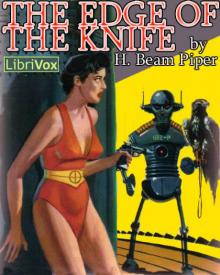 The Edge of the Knife
The Edge of the Knife Genesis
Genesis A Slave is a Slave
A Slave is a Slave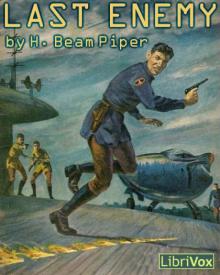 Last Enemy
Last Enemy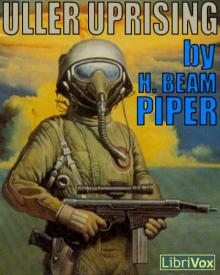 Uller Uprising
Uller Uprising Ministry of Disturbance
Ministry of Disturbance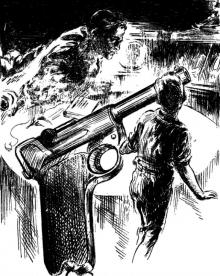 Time and Time Again
Time and Time Again The Mercenaries
The Mercenaries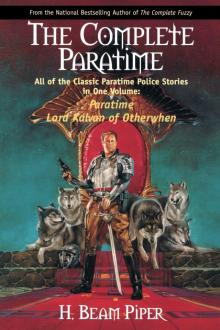 Police Operation
Police Operation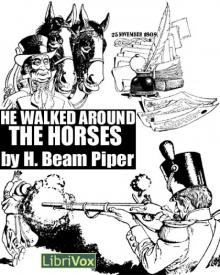 He Walked Around the Horses
He Walked Around the Horses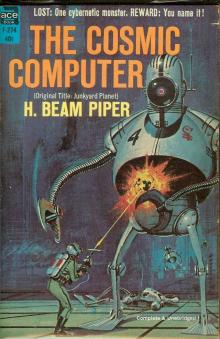 Time Crime
Time Crime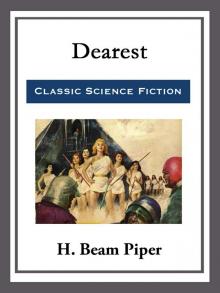 Dearest
Dearest Day of the Moron
Day of the Moron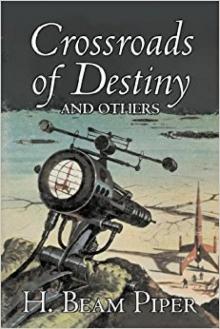 Crossroads of Destiny
Crossroads of Destiny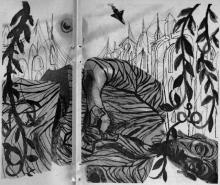 Graveyard of Dreams
Graveyard of Dreams The Cosmic Computer
The Cosmic Computer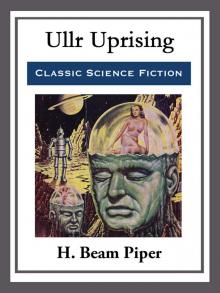 Ullr Uprising
Ullr Uprising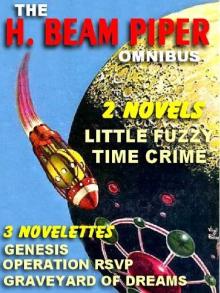 Operation R.S.V.P.
Operation R.S.V.P.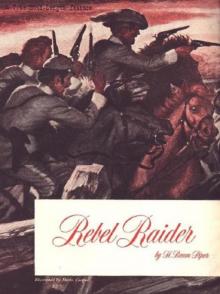 Rebel Raider
Rebel Raider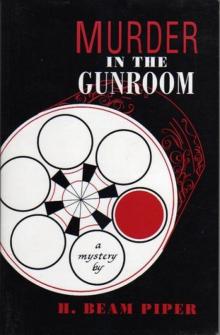 Murder in the Gunroom
Murder in the Gunroom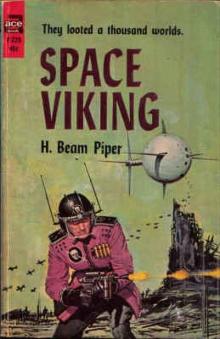 Space Viking
Space Viking The Answer
The Answer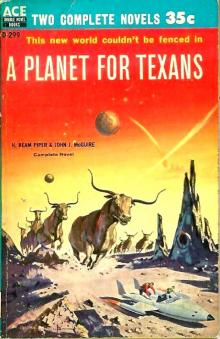 A Planet for Texans (aka Lone Star Planet)
A Planet for Texans (aka Lone Star Planet)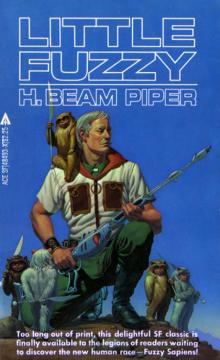 Little Fuzzy
Little Fuzzy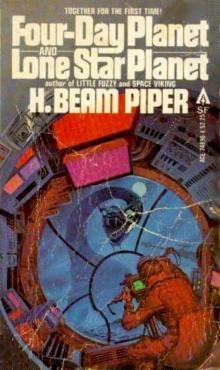 Four-Day Planet
Four-Day Planet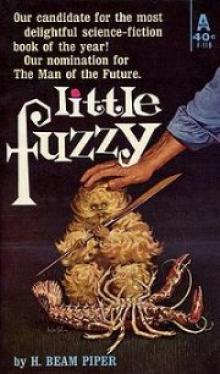 Little Fuzzy f-1
Little Fuzzy f-1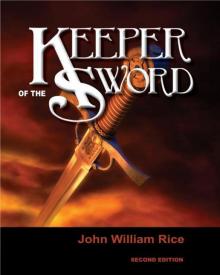 Keeper
Keeper The H. Beam Piper Megapack
The H. Beam Piper Megapack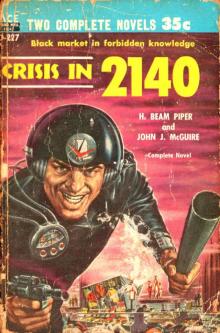 H. Beam Piper
H. Beam Piper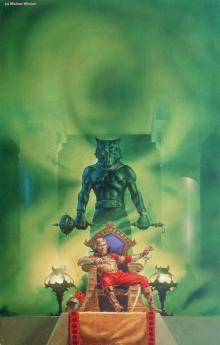 Lord Kalvan of Otherwhen
Lord Kalvan of Otherwhen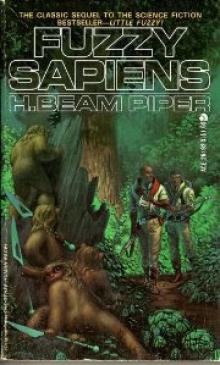 Fuzzy Sapiens f-2
Fuzzy Sapiens f-2 Fuzzies and Other People f-3
Fuzzies and Other People f-3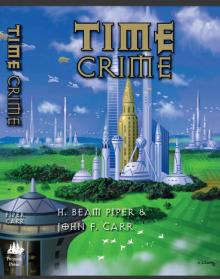 TIME PRIME
TIME PRIME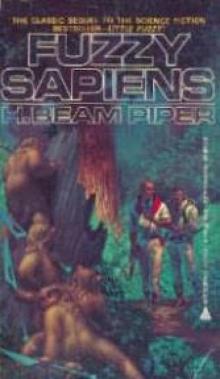 Fuzzy Sapiens
Fuzzy Sapiens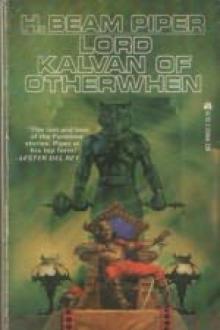 Lord Kalvan of Otherwhen k-1
Lord Kalvan of Otherwhen k-1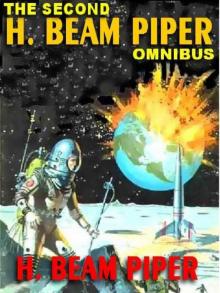 The Second H. Beam Piper Omnibus
The Second H. Beam Piper Omnibus